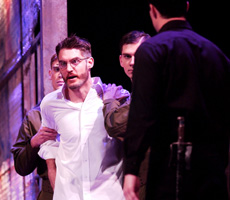‘King Lear’ sheds light on aging

Carol Matteucci
October 21, 2004
The lights begin to dim in the playhouse as Act I is about to begin. “I’ll Be Seeing You” by Frank Sinatra begins to play in the background as a man, dressed in a ceremonial uniform, enters the stage. Other men and women soon join him, wearing garb that looks like it was lifted right out of the set of Casablanca. Soldiers appear and place a lectern with microphones at the center.
Clearly, this is not a typical production of William Shakespeare’s King Lear, a play about an English king who reigned before the birth of Christ.
Robert Anderson, the director, set the play to begin in 1947, two years after the end of World War II.
“It’s close to us now that we can sort of remember, or at least some of the older members of the audience (can),” Anderson said. “But far enough away so we can create a look (of the old days).”
When King Lear opens tonight at 7:30 p.m. at the Colwell Playhouse of the Krannert Center for Performing Arts, it will be the first time the University has produced it as a student training play since 1956.
Get The Daily Illini in your inbox!
The production process began a year ago to give proper attention to designs and choreography. Actors were cast in spring so they could study their characters and memorize their lines over the summer.
“It’s a really large cast, which made things more difficult,” said Stacy Barton, a University graduate student who is the assisting costume designer. But she was confident in the designs.
“I think the design concept came together really well,” she said. “I’m interested to see how everything will look on stage after seeing everything up close.”
Anderson, a professor in the University’s department of theatre, said that the play was cut from four hours to two and one half hours.
But Anderson said the balance of emotions – which he considers a critical element of the play – remains intact.
“We have left the essence of the journey, especially Lear’s journey,” Anderson said.
Brent Barnes, a University graduate student who will play the role of the Duke of Albany, said the actors have been rehearsing four hours a day and six days a week since late August, said Barnes.
“It’s exhausting,” Barnes – who teaches in the morning, goes to class in the afternoon then heads straight to rehearsals. “But it’s the same thing as being an actor because you usually have a day job. So I guess it’s really good training.”
Henson Keys, chair of the University’s acting program, will play the role of Lear. He considered King Lear to be one of the most challenging plays to perform.
“This is a play you wouldn’t normally do in a training play,” Keys said. “It’s a huge emotional challenge.”
Keys said the play deals with the internal and external conflicts that emerge from the process of aging. Keys said it would be hard for a University student to be able to relate to Lear, which he believes is the reason why King Lear hasn’t been performed by the University for so long.
Barnes said Keys’ presence in the production has kept the actors upbeat.
“It’s been wonderful,” Barnes said. “He has been a great example of having fun in the middle of a heightened drama.”
Anderson also said the play, traditionally performed on stage in war time, could provide some insight.
“Sometimes (plays) can tell us a lot,” he said. “They can illuminate some things for us that we did not realize before.”






